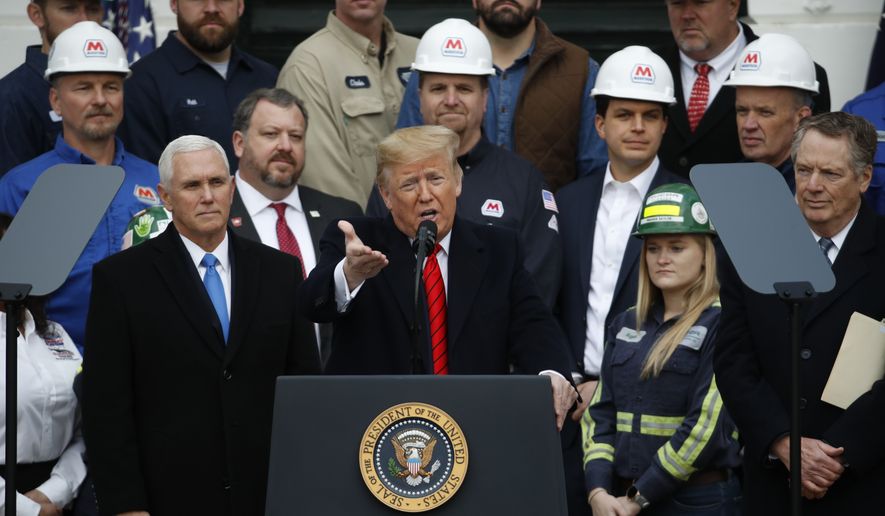President Trump signed his rewrite of the North American trade agreement in a White House ceremony Wednesday that bolstered his “promises made, promises kept” mantra to blue-collar voters as he battles impeachment and revs up his reelection campaign.
Members of both parties criticized the 1994 North American Free Trade Agreement for more than two decades, Mr. Trump said, but nothing changed until he brought his bare-knuckled deal-making to Washington and turned NAFTA into the U.S.-Mexico-Canada Agreement, or USMCA.
“They never even gave it a shot. They sold out,” Mr. Trump said in a freewheeling ceremony on the White House South Lawn. “But I’m not like those other politicians, I guess, in many ways. I keep my promises, and I’m fighting for the American worker.”
The trade deal will open Canadian markets for American dairy farmers, prohibit tariffs on digital products and boost domestic auto production.
The independent U.S. International Trade Commission estimated that the deal would modestly boost U.S. gross domestic product by $68.2 billion and add roughly 176,000 jobs over six years. The GDP now is $21.4 trillion, and the U.S. has 152 million nonfarm jobs.
Mr. Trump finalized an agreement with Canada and Mexico in November 2018, but House Democrats demanded better protections for labor and the environment.
House Speaker Nancy Pelosi, California Democrat, said Americans got a much better deal because of their efforts, though Mr. Trump shut Democrats out of the signing ceremony and promoted the pact as the direct manifestation of his 2016 presidential campaign.
At the time, Mr. Trump pledged to replace trade deals that seemed skewed against U.S. workers. He railed against NAFTA as “perhaps the worst trade deal ever made.”
“It’s probably the No. 1 reason that I decided to lead this crazy life that I’m leading now instead of that beautiful, simple life of luxury that I led before this happened,” Mr. Trump said Wednesday. “But I love doing it.”
Negotiations over NAFTA began under President George H.W. Bush and finished under President Clinton.
The deal was designed to spur free trade with the biggest U.S. export markets and is credited with boosting some U.S. wages. But some towns were hollowed out by factories that sought cheaper labor in Mexico, causing job losses in manufacturing and other sectors.
Mr. Trump drove a hard line with his North American neighbors by slapping tariffs on their steel and aluminum and threatening additional levies before settling on a deal to present to Congress.
The deal was signed amid record stock market gains and early-stage success in trade negotiations with China, clearing space for Mr. Trump to say he has “achieved more than I promised.”
Its flexibility allows the president to tout the deal in every town along the campaign trail.
“The USMCA — a massive win for New Jersey workers, New Jersey farmers, New Jersey union people, New Jersey manufacturers and everybody,” Mr. Trump told roaring supporters in Wildwood, New Jersey, on the eve of the signing.
The president could use the boost. Deep in a Senate impeachment trial, Mr. Trump praised Republican senators who will vote on whether to remove him from office over his interactions with Ukraine.
“Maybe I’m being just nice to them because I want their vote,” Mr. Trump told Senate Republicans at the White House. “I don’t want to leave anybody out.”
House Democrats, whose votes were needed for approval of the trade deal, were notably absent from the USMCA signing. Mr. Trump is seething over the two articles of impeachment those same lawmakers sent to the Senate for trial.
“The White House hasn’t invited House Democrats to their USMCA signing ceremony,” Pelosi spokesman Henry Connelly said. “But we’ll be well represented in the huge changes to the original USMCA draft that Democrats wrested out of the administration on labor, prescription drugs, environment and enforcement mechanisms.”
Those concessions cleared the way for Democrats to approve the deal in mid-December, one day after impeaching the president.
“What the president is signing is quite different than what the president sent us,” Mrs. Pelosi said.
Mexico has ratified the USMCA, so Mr. Trump’s signature puts pressure on Canada to act.
Ottawa started the process Monday, though opposition leaders are tempering Prime Minister Justin Trudeau’s hopes for swift approval.
Mr. Trump said American dairy farmers will especially benefit because Canada is opening its markets. The northern neighbor also will treat wheat imports the same as domestic wheat for grading purposes.
American Farm Bureau President Zippy Duvall said farmers appreciate the deal but warned that it had better work out.
“There is definitely increased optimism on farms and ranches across America and we’re grateful for the advances, but we’re also realists eager to see results — especially for our dairy and wheat producers,” he said. “We know it will take time for the new deals to go into effect and translate into increased sales. We’re eager to get back into full swing supplying safe, high-quality food and agricultural products around the world.”
Administration officials say Mr. Trump has accomplished a great deal.
“The president ran and was elected on replacing NAFTA with an agreement that puts American workers first — American farmers, ranchers and business first — that would bring manufacturing back, help service industry workers and raise wages,” U.S. Trade Representative Robert Lighthizer said. “Promise made and, three years later, promise kept.”
• Tom Howell Jr. can be reached at thowell@washingtontimes.com.




Please read our comment policy before commenting.